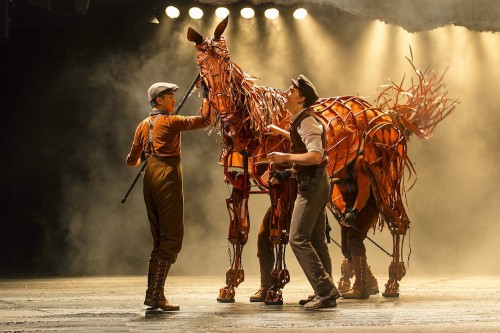
Andrew Veenstra (Albert) with Christopher Mai, Derek Stratton, Rob Laqui (Joey) in War Horse / © Brinkhoff/Mögenburg
There are two sides to The Kennedy Center’s War Horse. On one side, we have animals; on the other side, we have people—and by the end of the play, it’s evident the two sides are not equal.
The story surrounds a young man’s journey into the depths of WWI to save his beloved horse Joey, who has fallen behind enemy lines. With puppetry, music, and film, the show portrays the tragedy of war and the horrific treatment of animals during WWI.
Military technology runs down magnificent horses as if they’re just another weapon to be decimated. Both sides of the war use creatures around them as pawns; and even the heroes who want to save the animals feel helpless to do so.
At the show’s heart are life-sized puppets, which gallop across the stage in perfect character from the beginning of the production through its most dramatic moments. A raised ear, a deep breath, a startle—the horses and their incredible puppeteers can do anything. The stagecraft is simply thrilling; and the minimalist set and costuming show it off well.
The horses respond to war with fear and anger, desperate to find a way out of the dystopia. They draw us in, begging us to care for them, to want better for them—and we do. (I wasn’t the only one in the audience rushing home to cuddle with my dog afterward.)
Unfortunately, the animals aren’t the only side to the story.
The human characters in War Horse lack depth, which makes it impossible to sympathize with or understand many of their decisions. Perhaps the production wants to stress how unreasonable humans can be, especially in war; but even the naive main character’s decisions feel forced. As young Albert roams the French countryside, walking into bullets in search of a horse he doesn’t know is alive, you start to wonder if he just really needs a girlfriend.
The show’s sentimental plot seems unrealistic and far too coincidental at times. The actors’ accents come and go, the a cappella songs slide down by half-notes at a time, and the intensity level stays at a full, indiscernible yell throughout. Whenever the horses exit a scene, audience members shuffle in their seats, hoping it won’t be long before the puppets return.
And yet even with its flawed human half, War Horse is a masterpiece.
After all, you don’t go to War Horse to watch the humans. You go to see the puppetry and to imagine a world in which we treat animals with the compassion and respect they deserve. The backdrop could be a factory farm just as easily as WWI. No matter what the era, humans are the ones who choose brutality even when avoidable. We shame and abuse creatures around us and think very little of it, while the animals in our homes and on our farms continually reach out in loyalty and friendship.
At curtain call, the horses of War Horse come out last for their bow. The same audience that checks its collective watch whenever the puppets aren’t on stage suddenly rises to its feet, cheering and even crying as the puppeteers raise the creatures’ forelegs into a rear for a final impressive display.
In that moment, the story doesn’t matter anymore. We are charmed. And we realize the truth of the play really does resonate: in art, as in life, the animals are better than us.
War Horse performs through November 11, 2012 at the Opera House at the John F. Kennedy Center for the Performing Arts. The Kennedy Center is located at 2700 F Street, NW Washington, DC 20566. Closest Metro stop: Foggy Bottom/GWU (Orange/Blue line). For more information call 202-467-4600.

